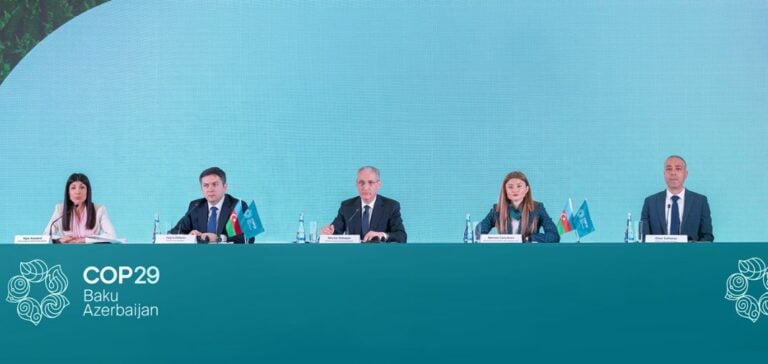Azerbaijan, which will chair the 29th United Nations Climate Change Conference in November, announced the creation of a climate fund at a press conference. The fund, called the Climate Finance Action Fund (CFAF), aims to finance the energy transition and adaptation to climate change in developing countries.
Contributions would come from producers of fossil fuels, such as oil, gas and coal, in the form of voluntary donations or amounts proportional to their production.
A call for voluntary contributions
Baku’s ambition is to raise an initial billion dollars through voluntary contributions from countries and extractive companies.
COP29’s chief negotiator, Ialtchine Rafiev, said that the fund would only get off the ground once this financial target had been reached and ten annual contributor countries had joined forces.
The CFAF, based in Baku, will finance renewable energy projects, decarbonization of agriculture and green industries, as well as responses to climate disasters via concessional loans or grants.
A multilateral fund under scrutiny
Rafiev stressed that the fund would be multilateral and would include representatives of contributors, including private and public oil and gas companies, under the supervision of an independent audit committee.
According to Li Shuo of the Asia Society Policy Institute, this initiative aims to give concrete form to the “polluter pays” principle, and to initiate discussions on the financial responsibility of polluters ahead of major negotiations on climate financing.
Mixed reactions
The proposal elicited mixed reactions.
Joe Thwaites, of the NGO Natural Resources Defense Council (NRDC), said that emphasizing the responsibility of fossil fuel producers is crucial to climate justice.
However, he stressed that multiplying funds will not necessarily solve the financing problem.
Friederike Röder, vice-president of Global Citizen, criticized the initiative, arguing that an actual tax, rather than a voluntary mechanism, is needed.
She noted that the five major oil and gas companies made $281 billion in profits over the last two years.
Accusations of greenwashing
For the NGO Oil Change International, inviting the fossil fuel industry to play the role of climate champion is a form of “greenwashing”.
The organization believes that a real tax on polluters and the ultra-rich is the solution to financing the trillions needed to combat climate change.
This issue will be central to discussions at the G20 Finance Ministers’ meeting in Rio de Janeiro from July 25 to 26, and Azerbaijan’s proposal will be closely scrutinized by the international community.
The creation of the Climate Finance Action Fund by Azerbaijan at COP29 raises crucial questions about the responsibility of fossil fuel producers in financing the energy transition and climate adaptation.
The debates surrounding this fund could influence future global climate policies.






















